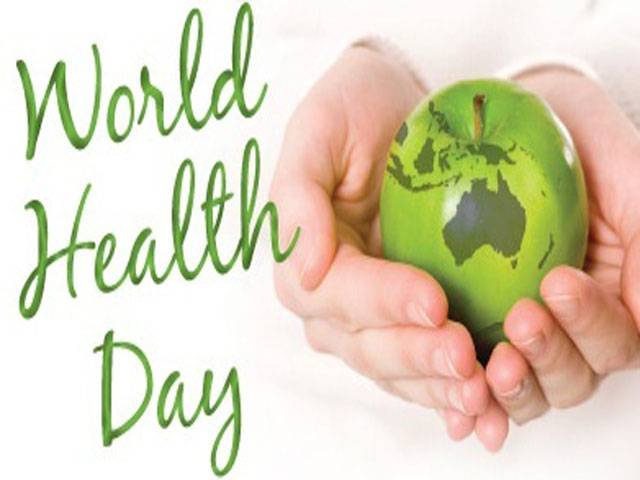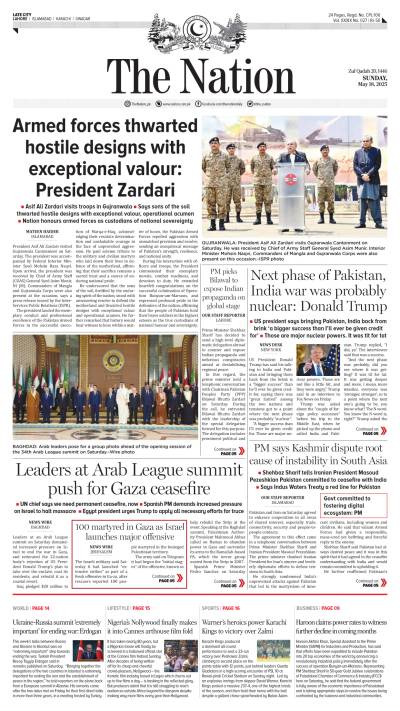ISLAMABAD - World Health Day is being observed today and the theme of this year’s World Health Day campaign is high blood pressure.This year’s campaign provides an opportunity to focus attention on the prevention and control of heart disease and stroke through a focus on hypertension and other risk factors. According to World Health Organisation (WHO) in 2008, more than one billion people worldwide were diagnosed with high blood pressure. Hypertension affects more than 1 in three adults aged 25 and over: In developing countries, this proportion is even higher and is increasing. The National Health Survey of Pakistan estimated that hypertension affects 18% of adults and 33% of adults above 45 years old. In another report, it was shown that 18% of people in Pakistan suffer from hypertension with every third person over the age of 40 becoming increasingly vulnerable to a wide range of diseases. It was also mentioned that only 50% of the people with hypertension were diagnosed and that only half of those diagnosed were ever treated. Thus, only 12.5% of hypertension cases were adequately controlled.Affordable solutions and tools to prevent and control high blood pressure are available for all countries. WHO DG Margaret Chan in her message states that the “ aim today is to make people aware of the need to know their blood pressure, to take high blood pressure seriously, and then take control.”High blood pressure (also known as raised blood pressure or hypertension) can lead to heart attack, stroke and other serious health problems. It affects more than one in three adults and is a contributor to more than nine million deaths worldwide every year. High blood pressure can also cause kidney failure, blindness, rupture of blood vessels and brain impairment. Many people do not know that they have high blood pressure because it does not always cause symptoms. Even though it is easily diagnosed and treated, many people do not have access to basic health services, particularly in low- and middle-income countries. High blood pressure is both preventable and treatable. Controlling high blood pressure, together with other risk factors, is the main way to prevent heart attack and stroke. Early detection is key; all adults should know their blood pressure. The risk of developing high blood pressure can be minimized by: cutting down on salt; eating a balanced diet; avoiding harmful use of alcohol; getting regular exercise; and avoiding tobacco use. For many people, lifestyle changes are sufficient to control blood pressure. For others, medication is required. Inexpensive medication exists, which is effective when taken as prescribed. It is essential that detection and control of high blood pressure (measurement, health advice and treatment), are coupled with simultaneous reduction of other risk factors that cause heart attacks and strokes, such as diabetes and tobacco use. They should be core elements of primary health care in all countries, and integral to efforts to reduce the growing burden of noncommunicable diseases. Civil society has an important role to play in helping to address high blood pressure. Industry can contribute to the solution, for example, by reducing salt in processed food and making essential diagnostics and medicines more affordable.
Sunday, May 18, 2025
World Health Day today with focus on blood pressure

Unpacking Modi’s Sindoor speech: A trail of terror
May 18, 2025
MQM-P urges PM to ease tax burden on salaried class
May 18, 2025
-
Lahore emerges among safest global cities in Numbeo 2025 index
-
Lahore emerges among safest global cities in Numbeo 2025 index
-
India’s suspension of Indus Water Treaty legally baseless
-
Seventh polio case reported in Pakistan amid nationwide vaccination drive
-
Pakistan reports sixth polio case of 2025
-
PTA begins issuing VPN licences to regulate usage
Culture Shift
May 18, 2025
Tactical Shift
May 18, 2025
Unmasked Cruelty
May 18, 2025
India Isolated
May 17, 2025
Descent into Hell
May 17, 2025
Fostering Entrepreneurship
May 18, 2025
Behind a Promising Job Offer
May 18, 2025
Indo-Pak Wisdom
May 18, 2025
Traffic Signal at Shahzad Town
May 18, 2025
English a Measure of Intelligence?
May 17, 2025
ePaper - Nawaiwaqt
Nawaiwaqt Group | Copyright © 2025





